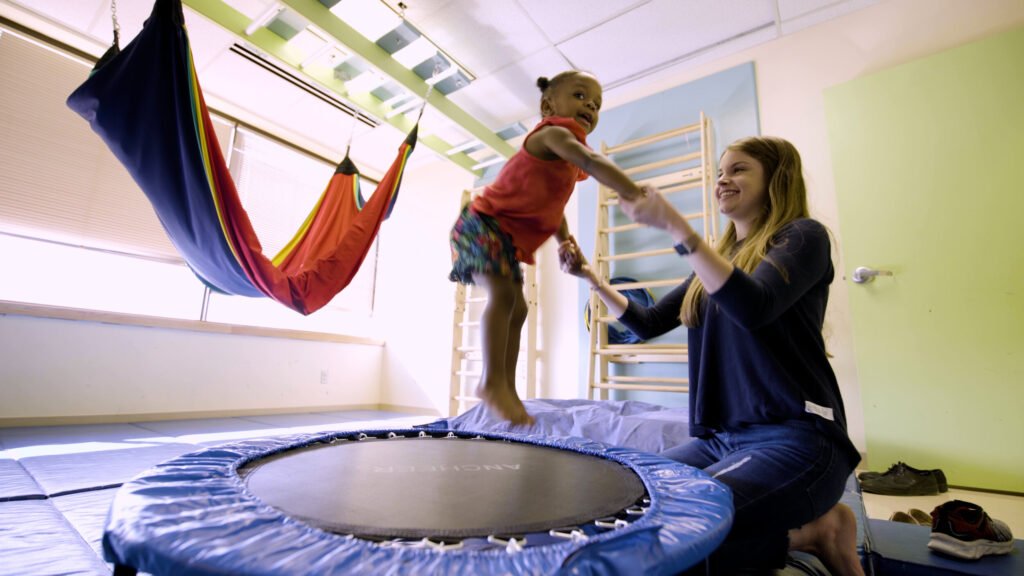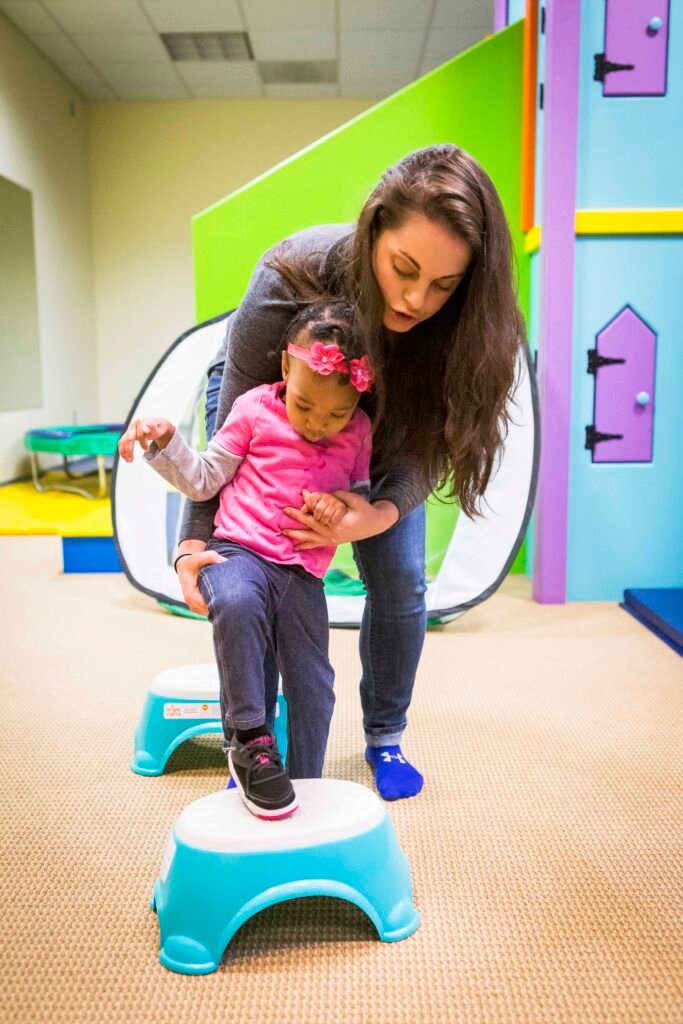Introduction to Pediatric Developmental Services:
Pediatric Developmental Services are supporting in children’s physical, emotional, cognitive, and social growth from infancy to adolescence.These specialised services, often provided by paediatricians, developmental specialists, and therapists, are essential for identifying developmental delays, managing behavioural issues, and promoting overall well-being. By offering early intervention and tailored programs, paediatric development services help children achieve their full potential and lead fulfilling lives.
At the heart of paediatric development services is early intervention, which is crucial in ensuring that any developmental delays or challenges are identified and addressed as soon as possible. This might include difficulties in motor skills, speech, language, or social interaction, which can become more apparent as a child grows.
Paediatricians, occupational therapists, speech therapists, and other specialists work closely with families to design individualised care plans that cater to the child’s unique needs. These interventions, whether through therapy or educational support, can make a significant difference in a child’s trajectory, particularly when introduced in the early stages of development.
In addition to addressing developmental delays, paediatric development services focus on providing ongoing support to children who may not have diagnosable conditions but could benefit from help in areas like learning, social skills, and emotional regulation. For example, many children experience anxiety, behavioural challenges, or difficulties adjusting to school environments. Paediatric specialists work to create a supportive environment, often collaborating with schools and other community resources to ensure that children have the tools they need to thrive.
This holistic approach, combining medical, psychological, and educational support, ensures that each child receives comprehensive care.Furthermore, paediatric development services are not just beneficial for children with apparent developmental issues but also for children with specific medical conditions such as autism, cerebral palsy, or Down syndrome.
For these children, multidisciplinary teams provide extensive, personalised care that often includes physical therapy, occupational therapy, and medical treatments aimed at enhancing their quality of life. Early and consistent intervention has been shown to significantly improve outcomes for children with such conditions, allowing them to engage more fully in daily life, school, and social activities.The family plays an integral role in paediatric development services as well. Specialists work to educate and empower parents, providing them with the resources and strategies they need to support their child’s growth.
Whether through family counselling, parental coaching, or involvement in therapy sessions, the goal is to create a strong support system that continues at home. By engaging parents as active participants in the treatment process, paediatric development services help foster a nurturing environment that extends beyond the clinical setting.

Benefits of Pediatric Development Services:
Paediatric development services offer numerous benefits, both for the child and their family, by providing targeted interventions and support during crucial stages of growth. These services aim to optimise a child’s physical, cognitive, emotional, and social development, setting a strong foundation for their future.
Below are some of the key benefits:
1. Early Identification and Intervention:
One of the most significant benefits of paediatric development services is the early identification of developmental delays or disorders. The earlier these challenges are recognized, the sooner interventions can be put into place to support the child’s development. This can prevent minor delays from becoming more significant and help the child catch up to their peers more effectively. Whether it’s speech and language therapy, occupational therapy, or behavioural interventions, timely support can make a lifelong difference.
2. Tailored and Holistic Care :
paediatric development services provide individualised care plans tailored to the specific needs of each child. This personalised approach ensures that the interventions and therapies are directly relevant to the child’s unique challenges. These services are often multidisciplinary, involving paediatricians, speech and language therapists, occupational therapists, and psychologists who work together to provide comprehensive care. This holistic care covers not just developmental delays but also behavioural, social, and emotional needs, ensuring a well-rounded approach to child development.
3. Improved Long-term Outcomes:
Children who receive early and appropriate support through paediatric development services often experience improved long-term outcomes. This includes better academic performance, stronger social skills, and enhanced emotional regulation. For children with specific developmental disorders such as autism, ADHD, or cerebral palsy, continuous developmental support can lead to more significant improvements in daily functioning, including greater independence and participation in social, educational, and recreational activities.
4. Support for Families:
Paediatric development services offer crucial support not only to the child but also to their family. Parenting a child with developmental challenges can be overwhelming, and families often require guidance on how to best support their child. These services provide education, counselling, and resources to help parents navigate the complexities of their child’s development. They empower parents to become advocates for their child and equip them with the skills necessary to implement strategies at home, creating a consistent and supportive environment.
5. Enhanced Social and Communication Skills:
Many children who benefit from paediatric development services, particularly those with speech delays or social difficulties, experience significant improvements in their ability to communicate and interact with others. Speech therapy, social skills groups, and play-based interventions help children develop the communication and social interaction skills necessary for building relationships, participating in school, and engaging in daily life activities.
6. Behavioural Improvements :
paediatric development services also focus on managing and improving challenging behaviours that may be related to developmental delays, emotional regulation difficulties, or disorders like autism and ADHD. Through behavioural therapies, children learn how to better manage their emotions, develop coping strategies, and build positive behaviours. These improvements often lead to better interactions at home, in school, and in social settings, fostering a more positive developmental experience overall.

7. Increased Confidence and Independence:
As children make progress through paediatric development services, they often gain confidence in their abilities and develop greater independence. Whether it’s learning new motor skills, improving communication, or managing their emotions better, these small victories contribute to a child’s sense of self-worth. This increased confidence allows them to participate more fully in school and social activities, preparing them for a successful transition into adolescence and adulthood.
8. Comprehensive Support for Children with Special Needs:
For children with special medical or developmental needs, such as Down syndrome, cerebral palsy, or sensory processing disorders, paediatric development services provide comprehensive, long-term care. These services offer ongoing therapy and medical management, helping to improve mobility, cognitive function, and daily living skills. The support extends to educational and vocational planning, ensuring that the child is prepared for a future that allows them to lead as independent and fulfilling a life as possible.
Disadvantages of Pediatric Development Services:
while paediatric development services provide essential support and interventions for children with developmental challenges, there can be some disadvantages or limitations associated with these services. These challenges can arise from a variety of factors, including accessibility, cost, and the effectiveness of certain treatments. Below are some of the key disadvantages of paediatric development services:
1. Limited Accessibility:
One of the most significant disadvantages of paediatric development services is that they may not be accessible to all families. In many areas, especially rural or underserved regions, there may be a shortage of qualified paediatric specialists such as developmental paediatricians, speech therapists, or occupational therapists. This lack of access can delay early intervention, which is critical for addressing developmental issues effectively. Families in these areas may have to travel long distances or wait extended periods for appointments, which can create additional stress and delay the support a child needs.
2. High Costs:
The cost of paediatric development services can be a significant barrier for many families. Depending on the type of services needed (e.g., speech therapy, occupational therapy, or specialised behavioural therapy), the expenses can quickly add up, especially if services are not covered by insurance. Even when insurance covers some services, there are often co-pays, deductibles, or limits on the number of sessions that are covered. For families with limited financial resources, the high cost of these services can make it difficult to obtain the necessary support, potentially affecting the child’s developmental progress.
3. Time-Intensive Nature:
Paediatric development services often require a substantial time commitment from both the child and the family. Regular therapy sessions, assessments, and follow-up appointments can take time away from other activities such as school, work, and family life. For parents, balancing work commitments and transporting children to therapy sessions can be overwhelming. Additionally, the therapeutic process often requires consistent and prolonged engagement to see significant results, which can be exhausting for both children and their caregivers.
4. Variability in Effectiveness:
The effectiveness of paediatric development services can vary depending on several factors, including the child’s specific condition, the quality of the service provider, and the timing of the intervention. Not all therapies work for every child, and some may show slower progress than others, which can be frustrating for families. For example, certain behavioural therapies or speech interventions may be more successful with some children than others, and it can take time to find the right therapeutic approach. Furthermore, children with complex needs may require a multidisciplinary approach, but the coordination between different services and providers may not always be seamless, potentially affecting the overall outcome.
5. Emotional and Psychological Stress:
For many families, the process of seeking and undergoing paediatric development services can be emotionally taxing. Parents may feel overwhelmed by the diagnosis of a developmental delay or disorder and may experience guilt, stress, or frustration if their child’s progress is slower than expected. The frequent appointments, therapy sessions, and the pressure to implement strategies at home can also contribute to parental burnout. Moreover, some children may find certain therapies challenging or frustrating, which can lead to emotional resistance or a sense of failure if they do not see immediate improvements.
6. Stigma and Social Challenges:
Another disadvantage of paediatric development services is the potential stigma associated with receiving therapy or being diagnosed with a developmental condition. While awareness and understanding of developmental disorders have improved in recent years, some families may still face societal stigma or judgement from others. This can lead to reluctance in seeking services, particularly if parents fear that their child will be labelled or treated differently by peers, teachers, or community members. Additionally, children themselves may struggle with feelings of being “different” or isolated if they require special services or accommodations at school or in social settings.
7. Over-reliance on Therapy:
in some cases, there can be an over-reliance on paediatric development services, with families placing all of their hope for improvement on therapy alone. While professional services are critical, it’s important to remember that development is a complex, multifaceted process influenced by various factors, including home environment, social interactions, and schooling. Families who focus solely on formal therapy may miss out on other developmental opportunities that arise from play, community engagement, or natural social interactions. Additionally, over-reliance on therapy can sometimes lead to frustration if progress is slower than expected, without considering other holistic aspects of child development.
8. Potential for Misdiagnosis or Over-diagnosis:
Another challenge is the potential for misdiagnosis or over-diagnosis. In some cases, children might be diagnosed with developmental conditions that they do not have, or their developmental challenges may be misunderstood. This can lead to unnecessary interventions or therapies that may not benefit the child, or, conversely, might overlook the root causes of their difficulties. Misdiagnosis can also place undue emotional and financial strain on families as they pursue therapies that may not be needed.
Conclusion
In summary, paediatric development services offer an array of benefits that promote not only the immediate well-being of children but also their long-term development and quality of life. By addressing developmental challenges early and providing targeted interventions, these services play a crucial role in helping children thrive in all areas of their lives.
While paediatric development services offer essential support for children facing developmental challenges, they are not without their limitations. Issues such as accessibility, cost, emotional stress, and the variability of outcomes can make it difficult for some families to fully benefit from these services. Additionally, the potential for misdiagnosis, the time-intensive nature of therapy, and the risk of over-reliance on professional interventions highlight the need for a balanced and thoughtful approach to paediatric developmental care. Despite these disadvantages, with proper support and access, paediatric development services remain a crucial tool in helping children reach their full potential.
you must watch 👁️👁️ this article 👇👇👇
Functional vs. Traditional Strength Training: What’s Best for You?




